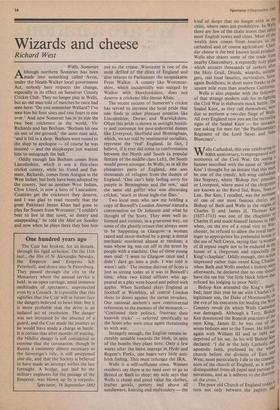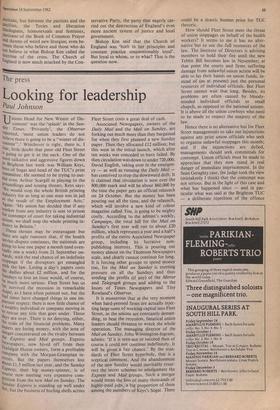Wizards and cheese
Richard West
Wells, Somerset
Although northern Somerset has been made into something called Avon, under the Heath-Walker local government Act, nobody here respects the change, especially in its effect on Somerset County Cricket Club. They no longer play at Wells, but an old man told of matches he once had seen here: 'Do you remember Wellard? I've seen him hit four sixes and two fours in one over.' And now Somerset has in its side the two best cricketers in the world, Viv Richards and Ian Botham. `Botham hit one six out of the ground,' the same man said, `and it fell in a shop. Botham went round to the shop to apologise — of course he was insured — and the shopkeeper just wanted him to autograph the ball.'
Oddly enough Ian Botham comes from Lincolnshire, which is not a first-class cricket county, while his friend and flat- mate, Richards, comes from Antigua in the West Indies; but both have been adopted by the county, just as another West Indian, Clive Lloyd, is now a hero of Lancashire. Counties get the cricketers they deserve, and I was glad to read recently that the great Pakistani Imran Khan had gone to play for Sussex from Worcester. 'I couldn't bear to live in that town, so dreary and unappealing,' he told the Mail on Sunday and now when he plays there they boo him
out to the crease. Worcester is one of the most defiled of the cities of England and also returns to Parliament the unspeakable Peter Walker. A county like Worcester- shire, which incidentally was merged by Walker with Herefordshire, does not deserve a cricketer like Imran Khan.
The recent success of Somerset's cricket has served to increase the local pride that one finds in other pleasant counties like Lincolnshire, Dorset and Warwickshire. Often this pride is shown in outright hostili- ty and contempt for post-industrial dumps like Liverpool, Sheffield and Birmingham, which, we are told by sentimental socialists, represent the 'real' England. In fact, I believe, if it ever did come to confrontation between the North and South (a popular fantasy of the middle-class Left), the South would prove stronger. In Wells, as in all the pleasanter parts of England, one sees thousands of refugees from the dumps of England. 'One can't help feeling sorry for people in Birmingham and the rest,' said the same old gaffer who was discussing cricket, 'stuck in those high-rise flats.'
Two local men who saw me holding a copy of Boswell's London Journal started a conversation on Dr Johnson and what he thought of the Scots. They were well in- formed and curious, in a gruesome way, on some of the ghastly crimes that always seem to be happening in Glasgow: • a woman raped and razor-slashed by a gang; a dental mechanic murdered almost at random; a man whose leg was cut off in the street by people with a machete. One of these young men said: 'I went to Glasgow once and I didn't dare go into a pub. I was told it wasn't safe.' The intense distrust of Scots is just as strong today as it was in Boswell's' time, when two kilted officers who ap- peared at a play were booed and pelted with apples. When Scotland plays England at football at Wembley, all central London shuts its doors against the tartan invaders. Our national anthem's now controversial references to the enemies of the monarch 'Confound their politics, frustrate their knavish tricks' — referred specifically to the Scots who were once again threatening us with war.
Strangely enough, the English remain in- curably amiable towards the Irish, in spite of the bombs they plant here. Only a few weeks after the latest outrage in Hyde and Regent's Parks, one hears very little anti- Irish feeling. This must infuriate the IRA.
Wells is a self-sufficient town. Women residents say there is no need ever to go to Bristol or Bath to shop; my wife says that Wells is cheap and good value for clothes, leather goods, pottery and above all needleware, knitting and embroidery — the
kind' of shops that no longer exist in the cities, where rates are prohibitive. In Wells there are few of the chain stores that infest most English towns and cities. Most of the wealth here comes from tourists to the cathedral and of course agriculture: Ched- dar cheese is the best known local produce. Wells also shares some of the trade from nearby Glastonbury, a reputedly holy place which attracts thousands of seekers after the Holy Grail, Druids, wizards, astrolo- gers, real food fanatics, survivalists, born- again Buddhists; in short more freaks to the square mile even than southern California. Wells is also popular with the followers of that strange modern cult for re-fighting the Civil War in elaborate mock battle. The Sealed Knot, as they call themselves, were due to perform a two-day Siege of All over England now you see the recruiting signs of the Sealed Knot — for instance, one asking for men for 'the Parliamentary Regiment of the Lord Sayes and Seles
Bluecoats'. Wells.
Wells Cathedral, this year celebrating its 800th anniversary, is impregnated with memories of the Civil War. On seeing 3 banner inscribed with the name of `Bishop Ken' I thought for an instant that this Must be one of the trendy, left-wing cathedrals like Stepney, where 'Bishop Jim' presides' or Liverpool, where most of the clergYmen are known as the Revd Sid, Russ, Stan or Len. But Ken, I recalled, was the surname one of our most famous clerics an ° Bishop of Bath and Wells in the reigns of Charles II and James II. Thomas Ken (1637-1711) was one of the chaplains to Charles II and made himself famous in 1683 when, on the eve of a royal visit to Win- chester, he refused to allow the royal barb" Inger to appropriate his prebendal house to the use of Nell Gwyn, saying that 'a woman of ill repute ought not to be endured in the house of a clergyman and especially the King's chaplain'. Oddly enough, this action impressed rather than vexed King Charles, when Bath and Wells needed a bishop so°,11, afterwards, he declared that no one shout have the see but 'the little black fellow that refused his lodging to poor Nelly'. Bishop Ken attended the King's cleat'!" bed; later that year he sat with Charles's II' legitimate son, the Duke of Monmouth, on the eve of his execution for leading the West, Country revolt (in which Wells Cathedra' was damaged). Although a Tory, Bishop Ken denounced the Romish practices of the next King, James II; he was one of the seven bishops sent to the Tower. He fell 0111 again with William III and in 1691 05 deprived of his see. In his will Bishop Kea declared: 'I die in the holy Catholic air apostolic faith, professed by the wwholechurch before the division of East and e West; most particularly I die in the comMT mon of the church of England, as it stall,"'s distinguished from all papal and puritan .1r1' novations, and as it adheres to the doctrine of the cross.'
The poor old Church of England today torn not only between the papists an l"
Puritans, but between the patriots and the Pacifists, the Tories and liberation theologians, homosexuals and feminists, Partisans of the Book of Common Prayer and dozens of weird new liturgies; even be- tween those who believe and those who do not believe in what Bishop Ken called the doctrine of the cross. The Church of England is now much attacked by the Con-
servative Party, the party that eagerly car- ried out the destruction of England's even more ancient system of justice and local government.
Bishop Ken said that the Church of England was 'both in her principles and constant practice unquestionably loyal'. But loyal to whom, or to what? That is the question now.



































 Previous page
Previous page